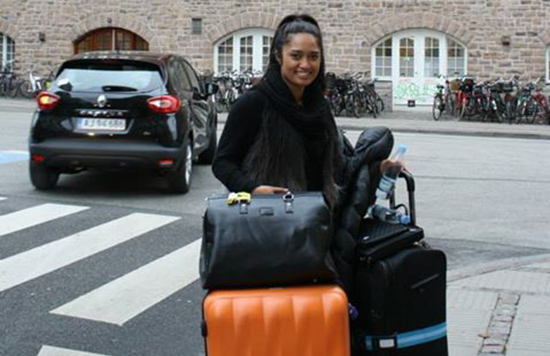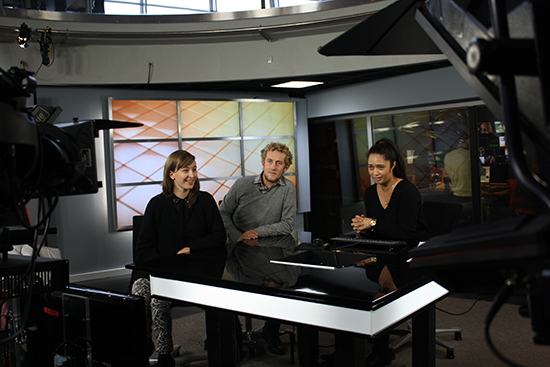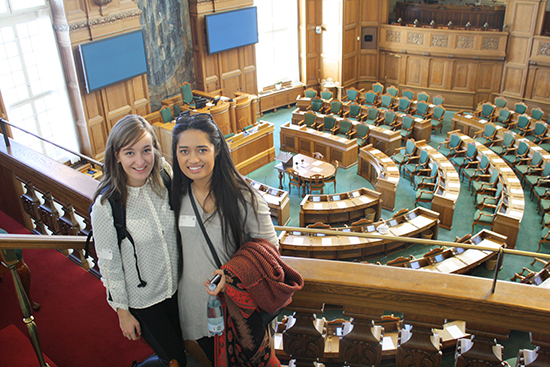
Inclusivity is something that can’t be taught; it has to be experienced.
This is the conclusion of six New Zealand journalism students who are studying in Aarhus, Denmark, for the inaugural semester of a new honours-level exchange programme, Inclusive Journalism Initiative.
“We talk a lot about globalisation and interconnectivity but I think it is a totally different level when you walk into a classroom and there is the United Nations there,” AUT University student Elesha Edmonds says. “That's perspective.”
The students, from AUT and Canterbury University, are part of a four-way partnership programme aimed at deepening journalistic ties and understanding between Europe and the Asia-Pacific region.
The Danish School of Media and Journalism and the Swedish School of Social Science in Finland round off the participating institutions.
Funded by the European Commission and New Zealand Education, the programme sees European students spend a semester in New Zealand while Kiwis head to Aarhus, Denmark, or Helsinki, Finland, for the exchange.
It’s coming up to the two-month mark for the students in Aarhus and so far they say the programme is making them rethink their understanding not just of diversity but of New Zealand’s place in the world.
'Refreshing change'
“It’s been a refreshing change,” says AUT student Struan Purdie. "In New Zealand we live and exist in this small bubble. We study in this bubble and everything we learn is within that context.
“So when we talk about inclusiveness this course is the essence of inclusiveness. We’re learning about European politics and foreign policy across the EU and stuff like this that actually we never touched on back in New Zealand.
Adds Canterbury University student Michael Knewstubb: “Any story that you report on here has a completely different context to what we had learnt back home.”
“The story I’m doing is about one of the poor areas in Aarhus. I can’t imagine there being a place like that back home - so while reporting on it, you learn a lot about the culture surrounding the issue and the same goes for every story we do here.”
As well as politics – cultural diversity and immigration have been stand-out learning points for the students.
“Something I’ve noticed is that New Zealand is very open to immigration,” AUT student Craig Hoyle says.
“We’re used to welcoming people from different backgrounds whereas Denmark has taken a very strong anti-immigration stance and I’ve noticed publicly you can see that reflected in how Danish people interact with others.
Being 'open'
Adds AUT student Star Kata (Ngapuhi): “You don’t really know where you’ve come from until you go somewhere else.
“It’s very weird when you walk down the street and people look at you like they’ve never seen black people before. So you almost have to take yourself out of yourself and just be open.
“And that translates into how you are as a journalist.”
All the students agree that getting out into the streets to talk with people and conduct interviews has been the most valuable experience of the exchange so far.
This hands-on reporting is what inclusive journalism is about, they say.
The Kiwis will be studying in Aarhus until June then be back to start in the second semester of university in New Zealand.
European course co-ordinator Inger Munk says this is the only course of its kind currently running between New Zealand and Europe.
Specific focus
Similar initiatives have been set up in the past but this is the first with a specific focus on inclusive journalism.
Just as the Kiwis are contextualising issues in Europe, students to the South Pacific will get a broad overview not just of New Zealand but of topical issues within an Asia-Pacific perspective.
Each participating university runs the programme as one semester of their respective degree.
This work is licensed under a Creative Commons Attribution-NonCommercial 3.0 New Zealand Licence.
THE IJI PROJECT
Reporting Europe and the Asia-Pacific
The IJI website






